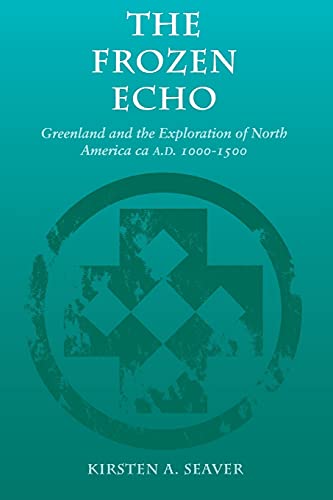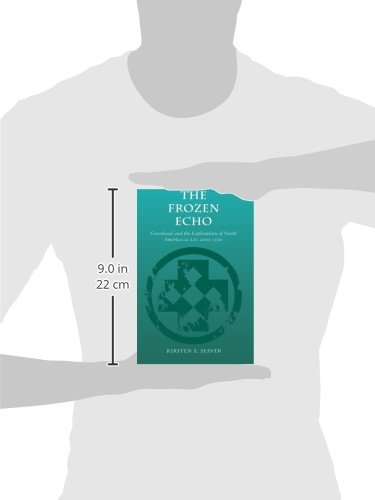Customer Services
Copyright © 2025 Desertcart Holdings Limited




The Frozen Echo: Greenland and the Exploration of North America, ca. A.D. 1000-1500
L**N
A Masterful HIstory of North Atlantic Exploration
This profound historical narrative recounts in detail the Norse experience in settling Greenland and exploring the margins of North America. The time frame is the five hundred years from the arrival of Eric the Red about 1000 AD until the disappearance of the Norse community around or shortly after 1500. The review also offers a plausible proposal as to what exactly happened to the Norse colony and its inhabitants at the end of this time frame.However, The Frozen Echo is more than a stimulating mystery tale. It is a thoroughly documented recounting of the entire realm of trade, exploration and settlement in the North Atlantic. We learn more than one reading can absorb about the plans, failures and dreams of Norse, Danish and Icelandic merchants, fishermen and adventurers, and how Greenland went from a promising door to the future to a forgotten outpost of European culture by the time the colony was uninhabited. The significant figures in this history range from Leif Ericson and his brothers to Icelandic nobles to Christopher Columbus and John Cabot. The role of the Portuguese also becomes significant as Europe contends with new transatlantic discoveries and nations compete for land, trade, fish and prestige.Kim Seaver, the author, displays an encyclopedic familiarity with both the written archives of all these peoples as well as the archaeology of Greenland, Vinland and the other likely Norse discoveries. She also exhibits and explains clearly the history of the codfish trade and its role in exploration and trade. For any serious student of Atlantic history, this is a must read. The tables at the end include both a useful timeline and a set of genealogical tables for the key families engaged in trade, settlement and exploration.I bought this book as a present for my husband, Robert Sweeney. This is his review.
F**Y
Superb look at Norse Greenland
For those of us that are fascinated by the extinction of Norse colonies in Greenland in the late fifteenth/early sixteenth century, this book is a treat. The writer is readable and unerringly smart, and is the only one I've ever read that really jumps into what happened at the time. I would love to meet this writer!So, if you want to know about life and why and how it probably ended for the Norse in Greenland (no spoilers), get this book. Now.
J**R
Excellent Book
Seaver goes into detail about Greenland's two settlements. Her theory on why the Western Settlement disappeared was very interesting. Follow the story from Lief Eriksson to the early 15th-century cod fishermen. Seaver leaves no stone uncovered.
J**D
A thoroughly researched book
Easy to read and well researched on a great topic
J**R
book arrived in fine shape
well done, shipped promptly and was in excellent condition
L**H
But a good mystery, thoroughly researched
Fascinating. A very dense read so not for the faint of heart! But a good mystery, thoroughly researched.
L**S
What happened?
The author explains what may have happened to the Greenland settlement colonized by the Icelanders and Norwegians, and which by about 1500 had ceased. Who, why and how it was colonized, and later on the conditions and European events that affected it. Well written and hard to put down.
C**N
For my Scandinavian heritage it gives an insite to early history .
Not only are Iceland and Greenland covered, but also the homelands, and minor explorations into NA. It is an interesting read.
C**E
Impressive for the most part but some issues
This is a fascinating book which combines a great deal of knowledge of the Greenland Norse with much about Scandinavia and European exploration in the North Atlantic at the dawn of the Age of Discovery. The author is clearly deeply knowledgeable about Scandinavian languages which is clearly a major advantage and gives her access to a large body of research that might escape other writers. A huge amount of material has been accessed and synthesised to produce this book.Much of it is extremely engaging and satisfying. The early parts about the Norse settlement and exploration is packed with detail and backed up with an impressive array of research on crucial aspects such as the extent of the Greenlanders' visits to America. Given the total lack of any Norse Greenlander sources the author has done a very fine job of constructing a convincing narrative with plenty of firm academic support. She is happy to engage competing interpretations, giving a balanced picture of the Greenlanders and their lives. From what I have read elsewhere (I am a historian but not an expert on the Medieval Greenlanders) this strikes me as a very thorough and detailed treatment which provides as complete an overview as it is possible to read.I do, however, have some reservations. Seaver strikes me as reacting, to some extent, against environmental factors as a cause for the disappearance. She seems to reject these factors to an extent which strikes me as excessive. I entirely accept the premise that such environmental factors were decisive has been over-used in many quarters. For example, in Collapse Jared Diamond (despite his protestations to the contrary) pretty much pins the whole blame on the environment. Seaver attempts to refute any major role for climate in the demise of the Greenlanders, which I find odd to say the least. There is extensive material available which suggests that there was a notable environmental decline in the later Norse period. Works by the likes of Jette Arneborg are freely available which state this quite explicitly. Sadly for me this leads to Seaver's conclusions being unsustainable. Her main suggestion for the reasons for the end of the colony seem extremely tenuous and frankly unlikely, which undermined the positive aspects somewhat. Also she seemed to write off the Western Settlement with little real attempt to provide an explanation for its demise.Overall an excellent book but let down by her obvious hostility to environmental arguments, which leads her to reach too far in her conclusions and propose a final interpretation which I don't think is more than speculation.
T**N
From a review on the cover "a model of how to put across a complex theme in an easy to read manner"
Does exactly what it says on the tin and does it superbly.A scholarly, sceptical account of the literary and archaeological materials currently available.No earth shattering revelations but there are too many unknowns in this field.From a review on the cover "a model of how to put across a complex theme in an easy to read manner".I loved.it, if you like real history you probably will.
Trustpilot
4 days ago
2 weeks ago